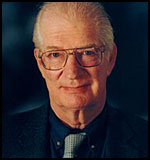
This guest essay comes from Herman E. Daly, an ecological economist and professor in the School of Public Policy at the University of Maryland, College Park. He’s one of the experts featured in Leonardo DiCaprio‘s new eco-documentary The 11th Hour, which opens in L.A. and New York on Aug. 17 and in other spots around North America on Aug. 24.
The recent increase in attention to climate change is very welcome. Most of the attention seems to be given to complex climate models and their predictions, however. It is useful to back up a bit and remember an observation by physicist John Wheeler: “We make the world by the questions we ask.” What are the questions asked by the climate models, and what kind of world are they making? What other questions might we ask that would make other worlds?
The climate models ask: Will CO2 emissions lead to atmospheric concentrations of 500 parts per million? And will that raise temperatures by 2 or 3 degrees Celsius, or more, by a certain date? And what will be the likely physical consequences in climate and geography, and in what sequence, and according to what probability distributions? And what will be the damages inflicted by such changes, as well as the costs of abating them? And what are the ratios of the present values of the damage costs compared to abatement expenditures at various discount rates, and which discount rate should we use, and how much new information we will learn in the meantime?
What kind of world is created by such questions? Surely a world of such enormous uncertainty and complexity as to paralyze policy. Scientists will disagree on the answers to every one of these empirical questions.
Could we ask a different question that creates a different world? Why not ask, can we systematically continue to emit increasing amounts of CO2 and other greenhouse gases into the atmosphere without eventually provoking unacceptable climate changes? Scientists will overwhelmingly agree that the answer is no. The basic science, first principles, and directions of causality are very clear. Focusing on them creates a world of relative certainty, at least as to basic thrust and direction of policy. Only the rates and sequences, timing, trajectories, and valuations are uncertain and subject to debate.
As long as we focus on measuring inherently uncertain empirical consequences, rather than on the certain first principles that cause them, we will overwhelm the consensus to “do something now” with the second order uncertainties of “first knowing the exact consequences of what we might someday do.”
To put it another way, if you bail out of an airplane, you need a crude parachute more than an accurate altimeter. And if you also happen to take an altimeter with you, at least don’t become so bemused in tracking your descent that you forget to pull the ripcord on your parachute.
The next question we should ask is, what is it that is causing us to systematically emit ever more CO2 into the atmosphere? It is the same thing that causes us to emit more and more of all kinds of waste into the biosphere: namely, our irrational commitment to exponential growth forever on a finite planet. Again we ask the wrong question. For example, can my firm emit more CO2 without causing any identifiable harm to any specified person? Yes, no doubt it can. Can all firms do this without causing much harm to many people with a high degree of probability? No, certainly not. Also, instead of asking, when will we be rich enough to afford the cost of protecting the environment? we might instead ask, does growth in GDP at the current margin and scale in the U.S. really make us richer? Might it not be increasing environmental and social costs faster than it increases production benefits, thereby making us poorer? It is clear that we need an aggregate limit on CO2 emissions to avoid this “uneconomic growth.” It is easy to preach the traditional dogma of economic growth. It is something else to demonstrate that growth in GDP has not in fact become uneconomic. Economists have so far run away from this challenge.
Is it hard to come up with a reasonable policy? Not really — a stiff severance tax on carbon, levied at the well head, mine mouth, or port of entry, would go a long way by both reducing carbon use and giving an incentive for developing alternative carbon-free technologies. Yes, but how do we know what is the optimal tax rate, and wouldn’t it be regressive, etc.? Once again, we make the world by the questions we ask. We need to raise public revenue somehow, so why not tax carbon extraction heavily and compensate by taxing income lightly? More generally, tax the resource throughput (that to which value is added) and stop taxing value added. Tax bads (depletion and pollution), not goods (income). Does anyone imagine that we tax income at the optimal rate? Better first to tax the right thing and later worry about the “optimal” rate of taxation, compensation for regressivity, etc. People don’t like to see the value added by their own efforts taxed away, even though we accept it as necessary up to a point. But most people don’t mind seeing resource rents, value that no one added, taxed away. And the most important public good served by the carbon tax would be climate stability, brought about by the consequent reduction in use of carbon fuels and the incentive to invent less carbon-intensive energy sources. And much of the revenue from the carbon severance tax could be rebated to the public by abolishing other taxes, especially regressive ones.
Setting policy in accord with first principles allows us to act now without getting mired in endless delays caused by the uncertainties of complex empirical measurements and predictions. Of course, the uncertainties do not disappear. We will experience them as surprising consequences, both agreeable and disagreeable, necessitating mid-course correction to the policies enacted on the basis of first principles. But at least we will have begun moving in the right direction.
To continue business as usual, while debating the predictions of complex models in a world made even more uncertain by the way we model it, is to fail to pull the ripcord. The predicted consequences of this last failure, unfortunately, are very certain.



